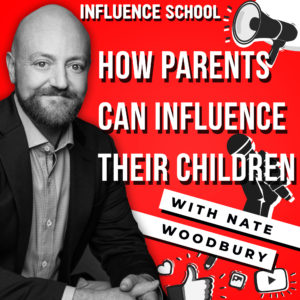
Download Now!
Dr. Paul Jenkins is a Positive Psychologist and he teaches a lot about positive parenting. In today’s episode, he along with YouTube Producer Nate Woodbury touches on the topic of controlling and manipulating our children versus instilling a good influence on them. Check it out!
Welcome back. Here with Paul Jenkins. Some of the videos that have been most popular on your channel are around parenting. -Yeah. -How to got to get your kids to listen without yelling. So, in this video, we’re talking about influence again. But how parents can influence their children. Alright. So when we’re talking about parenting our children, we want to give our children choice and they do have choice. We can’t make choices for them. But we do have influence, right? -Yes. In fact, that’s one of the first things that came to my mind around this topic, Nate. Parents do influence their children. -Is that at all ages? More or less a different time? -You can’t not influence your children. In fact, there… I think the main question is, “How do we influence our children? What kind of an influence are we going to have on our children?” But you will influence your children for sure. -Okay. So, even if we’re not doing it intentionally, maybe influencing them for positive, we might be influencing them… -One way or the other. -Okay. -Yeah. So, the influence that we have with our children, I think boils down to 2 primary factors. Number 1, you have to be able to set and enforce appropriate limits. -Okay. -And this has to do with sharing of control. There’s a model that I shared on my channel about how control and maturity go together. And the more mature kids are, the more control they can have over their own life. That’s the short version. Well, until they reach that level of maturity, somebody’s got to be in control. And I hope that that’s the parents. Because if the parents default, guess who’s next in line? It’s the State. -The government. -Right, the courts, the police ,the Youth Corrections. So we really want kids to be in control of themselves. But they can only do that when they reach a level of emotional and moral maturity that allows that. So parent have to take up the balance of that control while kids are less mature. -And more and more of that control is given kind of in by degree. -Yes. -As their maturity increases. -As their maturity increases. Exactly. -So,is influence and control… Are we’re talking about 2 separate things here then? -Yes. Because control… Think about it. There are some things you control and other things you don’t. If you control it, control it. If you can’t control it, your only hope is influence. -So, let’s give some specific examples or what some things that you can only control? -So, you can control for example what you provide. And there’s some freebies. You have to provide certain things to your kids. There’s 5 actually. Shelter is one. -And I’ve heard of it. Let’s see however. Yeah, shelter, food? -Uh-huh. -Is water separate? Or is that? -Water is separate. -Air? -Yes. -Some people skip that when they forget. And you don’t provide your kids air. -Clothing? -Well, I put that in with shelter. It’s what’s your main job as a parent? You heard this from me before. -Love. -To love them no matter what and even if. So, love, air, water, food and shelter. Those are freebies. There’s 5 of them. You don’t get to mess with those. -Is there a law against the love portion? Because if you don’t provide shelter or proper care but there should be there should be a law… -Well… Yeah. And it depends on the jurisdiction. But there are some statutes out there about emotional abuse for example. That’s probably the closest that comes or neglect. Your job as a parent is to love your kids. And that’s not a legal obligation as much as it is a moral, ethical obligation. -Okay. So, we’ve got areas that we control. We control their environment, we can… And we control over their safety, their security. -Right. -So now, let’s… Let’s jump over into influence. -So, to influence, you have to be able to set and enforce appropriate limits. And that has to do with getting straight on the control and maturity, okay? The second thing that’s required to have influence… This is interesting. This came out of the research. You have to be seen as a provider of good times and good things. In other words, they have a positive impression of you because of the good things that you bring into their life. If you… If you can set and enforce limits but you’re not seen as a provider of good times and good things, they won’t respect you. You don’t have authority. -Make sense. If you provide all kinds of good things but you can’t enforce limits, then you still don’t have any authority or influence with that child. -So the child might comply in in certain situations but they’re… As they mature and whatnot, they’re not really going to respect… -Right. -Yeah. They’re just going to be making their own choices independent of their parents influence. -The other thing that goes into this. And we talked about this in another video about influence. Where’s our focus as a parent? If we are truly focused on what we called the influencer quadrant in that other video, where our focus is on how they feel about themselves. When we’re truly invested in that child’s best interest for their sake. In other words, we’re not doing the discipline because it makes our life easier. Even though it might. But that’s secondary. Our primary focus is on that child, how they feel about themselves. Their own interest. When our focus is there. And we… We can set and enforce limits and we’re seen as a provider of good times and good things. Then we truly have influence. -So that. That makes it simple in my mind. -It is simple. -Where let’s say.. -Simple and easy aren’t the same thing though. -Let’s say my son is doing a homework. He’s having a real challenging time. Maybe he’s just frustrated and he, you know, says, “I just don’t like math, I’m not good at math,” -Yeah. -And I want to want to step in. You know, there’s a variety of things that I can do but if my focus is helping him feel good about himself, kind of putting the focus on that he’s great at math and showing him his capabilities and… That’s the best way that I can influence him. -Why do you care if he gets his math done? Is it about showing that you’re a good father? Well, that’s not focused on him and his interest. If you really understand his getting his math done is good for him, see that’s where we start with the focus. And then be able to arrange the limits around that. -Alright. So, what about a scenario maybe teenagers. And… -They’re fun. -We feel that my daughter… Let’s say, she’s made some friends that I wish she would choose some different friends. -Mm-hmm. -And I kind of want to influence the best that I can because I care for her and I want what’s best for her. -Mm-hmm. -How should I approach that situation? -Now, it’s fun when we work with teens because they are more mature physically. They take more control. -Mm-hmm. -Whether you want to share it with them or not, they take the control. So, your relationship becomes even more important as these kids get older and especially in their teenage years. Your relationship is what’s going to create the influence there. -Okay. And don’t try to control something that you don’t control. So she might come to you and say, “Dad, I really want to go to this party.” Okay. A good response to that is, “Tell me more.” Okay? These kids kind of leave you in the dark about some of the crucial details. So, get her to tell you more about party. Now, let’s say that you’re not comfortable with her going to the party. What do you control? Do you control whether she goes to the party or not? Probably not. -Probably not. -Probably not. How many teens have snuck out to go to the party? Okay? I don’t think you control that. Not at this point in the game. So, what do you control? You control whether you give her permission or not. -Yeah. -Now this is huge because what if you said, “Sweetie, it’s up to you. I am NOT giving you my permission. So, if you go you’re going without my permission. Any questions?” -So, what I… Something you said earlier is building a relationship. So, if over time I’ve had that focus on, you know, how they feel about themselves and I’ve focused on building that relationship and generally caring. When it comes to this specific scenario, my permission really means a lot. -It does. More than you think. She does not want to go without your permission. Why? Because you can set and enforce limits. And she knows that there’s going to be a consequence she’s not going to like if she goes without your permission. And she doesn’t want to disappoint you because of the relationship. -Okay. So, influence isn’t a tactic that we’re like, “Alright. I want her to make this choice. So, I’m going to use this strategy to get in here…” -Not a manipulation. -Yeah. So, it really is about… If I… If I want to influence my children, it’s something that’s going to grow and build over time as there’s a relationship of trust built and that there’s love and it’s focused on how they feel about themselves? -Yeah. Well said. -So, there you have it. That’s how parents can influence their children. If you liked this episode, whether you’re watching on YouTube or LinkedIn, give us a thumbs up. -Yeah. -Then we can, you know, people liked this episode. Comment below share it and we’ll see in the next episode.
